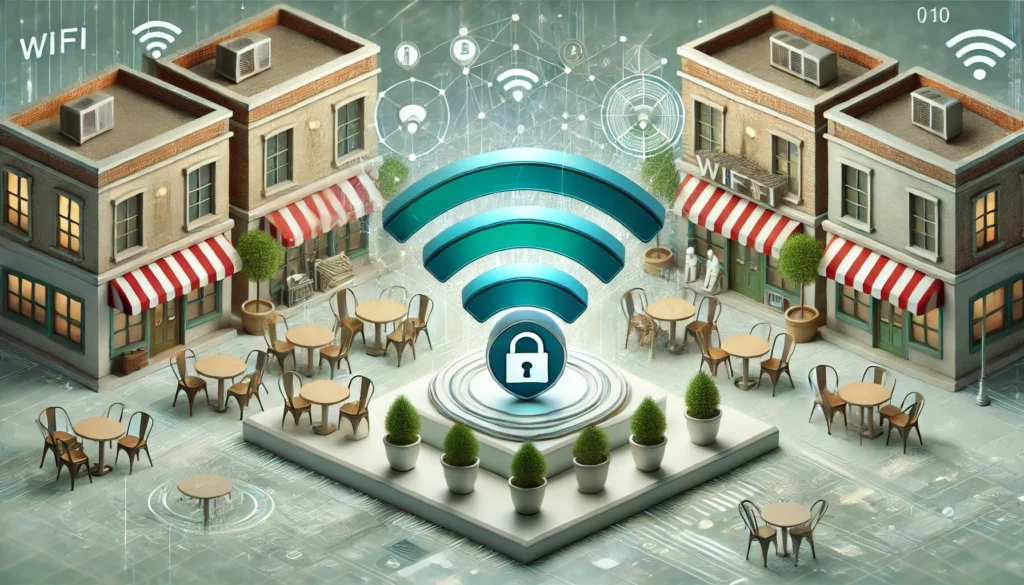Securing Your WiFi in Public Areas:
How to Secure Your WiFi When Using Public Networks
Table of Contents
Toggle
Whether you’re working at a coffee shop, traveling, or simply enjoying a break at the airport, connecting to public WiFi seems like a convenient option. However, public WiFi networks can expose your personal data to hackers if you’re not careful. Even though public WiFi offers easy access, it’s important to take steps to protect yourself when using these networks.
Why Public WiFi Is Risky
Public WiFi networks are often not as secure as private networks. They typically lack strong encryption, meaning that anyone sharing the network can potentially view or intercept your online activities. Hackers can easily exploit these vulnerabilities to steal your personal information, including login details, credit card numbers, and other sensitive data.
Here are some common threats:
- Man-in-the-Middle Attacks: Hackers can intercept the data between your device and the WiFi network, capturing sensitive information.
- Fake Hotspots: Hackers may set up fake WiFi networks with names similar to legitimate networks, tricking you into connecting to them.
- Unencrypted Networks: Without encryption, the data you send and receive can be easily intercepted by anyone nearby.
To stay protected, it’s essential to secure your connection before you start browsing on public WiFi.
Tips to Stay Safe on Public WiFi
Here are some easy-to-follow tips for securing your WiFi connection in public spaces:
1. Use a Virtual Private Network (VPN)
A VPN is one of the most effective ways to secure your connection on public WiFi. It encrypts your internet traffic, making it almost impossible for hackers to intercept or read your data. When you use a VPN, your data is tunneled through a secure server, keeping your personal information private.
You can find several reliable VPN services available for both computers and smartphones. Make sure to activate your VPN before connecting to public WiFi to ensure your browsing is protected.
2. Turn Off Automatic Connections
Many devices are set to automatically connect to available WiFi networks, which can be risky in public spaces. To avoid accidentally connecting to insecure or fake networks, disable the “auto-connect” feature on your phone, tablet, or laptop. This way, you’ll have full control over which networks you choose to connect to.
3. Verify the WiFi Network
Before connecting to any public WiFi, confirm the correct network name with the staff or signage. Hackers often create fake networks with names similar to legitimate ones, such as “FreeCoffeeShopWiFi” instead of “CoffeeShopWiFi,” to trick people into joining. Always double-check the name of the network to ensure you’re connecting to the right one.
4. Avoid Logging Into Sensitive Accounts
If you’re using public WiFi, try to avoid logging into sensitive accounts, such as online banking or work-related platforms, unless it’s absolutely necessary. Public networks aren’t secure, and exposing such accounts to potential hackers can put your information at risk.
If you must access sensitive accounts, ensure that the website you are visiting uses HTTPS (look for the padlock icon in the address bar). This encrypts the connection between your device and the website, adding an extra layer of protection.
5. Enable Two-Factor Authentication (2FA)
Two-factor authentication (2FA) adds an extra layer of security to your online accounts. Even if someone manages to steal your password, they won’t be able to access your account without the second form of verification, such as a text message or authentication app code. Whenever possible, enable 2FA on your important accounts to keep them secure, especially when using public WiFi.
6. Keep Your Software Updated
Keeping your device’s software up-to-date is crucial for security. Manufacturers regularly release updates that fix vulnerabilities hackers might exploit. Whether it’s your laptop, smartphone, or tablet, always install the latest updates for your operating system and apps to ensure that your device is protected.
7. Turn Off File Sharing and Bluetooth
When using public WiFi, it’s a good idea to disable file sharing and Bluetooth. These features can be entry points for hackers to access your device. Turning them off when you’re in a public space reduces the risk of someone gaining unauthorized access to your data.
8. Log Out When You’re Done
When you’ve finished using a website or service, especially on a public WiFi network, make sure to log out. Staying logged into accounts, particularly sensitive ones, increases the chance of unauthorized access. Logging out helps protect your information if the WiFi connection is compromised.
Final Thoughts: Protect Yourself on Public WiFi
Public WiFi is convenient, but it comes with risks. However, by following these simple steps, you can stay secure while enjoying the convenience of online access in public places. Always use a VPN, disable automatic connections, and be cautious about logging into sensitive accounts. With these precautions, you can browse with peace of mind, knowing your personal information is protected.
Remember: it’s always better to be safe than sorry when using public WiFi. Stay alert, stay secure!
